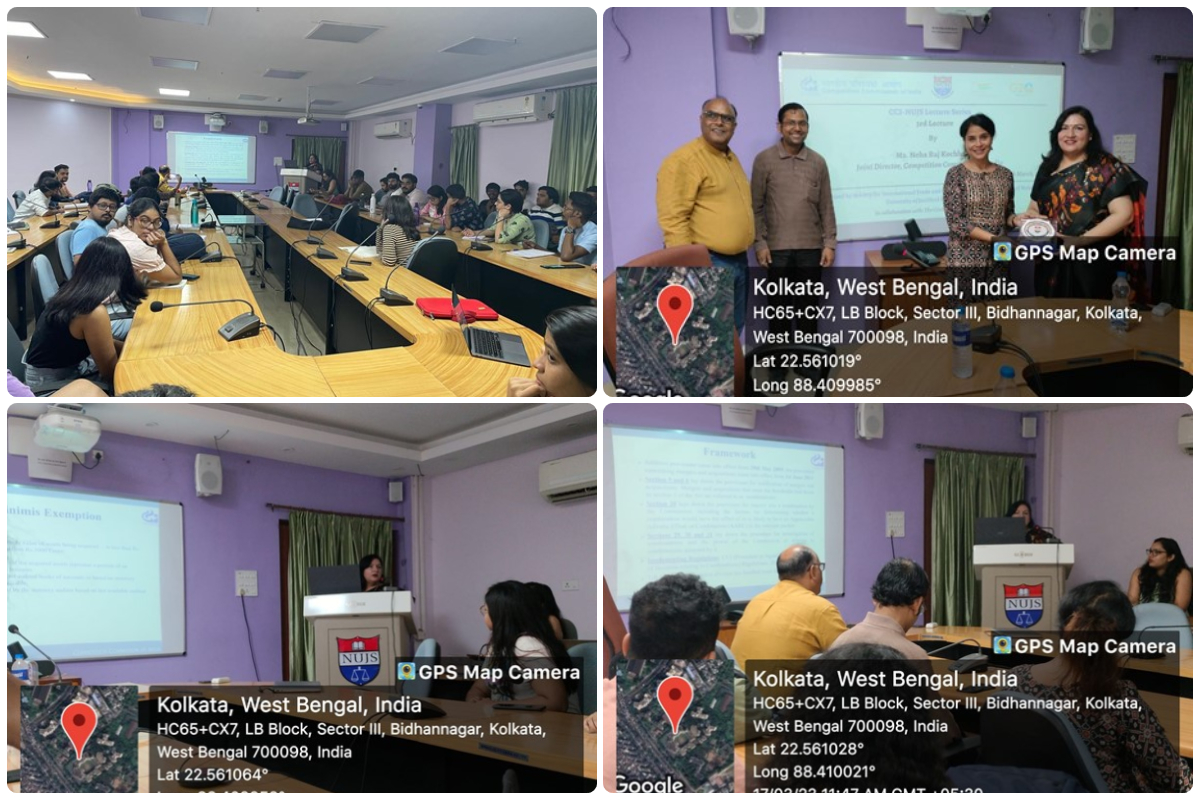LECTURE ON REGULATION OF COMBINATIONS WITH MS. NEHA RAJ KOCHHAR, JOINT DIRECTOR OF CCI: A COLLABORATION BETWEEN NUJS AND THE COMPETITION COMMISSION OF INDIA
Date: 17th March 2023. Event name: Regulation of Combinations
About: The West Bengal National University of Juridical Sciences (through its Society of International Trade and Competition Law, and Centre for Competition Law) conducted the 2nd Lecture of the CCI-NUJS Lecture Series, in collaboration with the Competition Commission of India. Ms. Neha Raj Kochhar, Joint Director of the CCI, delivered the Lecture.
Introduction/Objective:
The Competition Law protects a state of equilibrium in the business world; it focuses on controlling disparities between firms and supervising cartels. “The need for Competition Law arises because markets can experience failures or distortions, and various players can engage in anti-competitive activities such as cartels, abuse of dominance, etc. which adversely impact economic efficiency and consumer welfare,” the Competition Combination of India states.
The government regulates combinations, mergers, and acquisitions within the nation in order to foster competition and prevent smaller businesses from being eclipsed and absorbed by established sectors. This is due to the fact that when major corporations combine, it not only lessens competition but also makes it difficult or nearly impossible for smaller businesses to expand or turn a profit.
The speaker discussed the procedural requirements that must be met under the act, including the notification process and the threshold that is necessary to meet in order to get informed. The session looked into the concepts of vertical, horizontal and conglomerate combinations under the act. Additionally, the speaker talked about the exceptions in relation to the standard. The kinds of remedies offered by the aforementioned act were also discussed by the speaker. The first one is the order in which the parties and the CCI must move, beginning with notifying the Commission and ending with the distribution of the final order. According to the relevant Act sections, the transactions submitted to the Commission via notification may be approved, approved with a modification, or declared void.
Content and Outcome:
With the aid of case laws, the lecturer clarified the act’s nuances. The speaker drew attention to the 2019 Commission’s introduction of the “Green Channel,” a filter for certain types of merger deal or combination filings that don’t pose any threat to competition regimes and are approved automatically.
The Commission amended the Competition Commission of India (Procedure in regard to the transaction of business relating to combinations) Regulations, 2011, taking into account the demands of the market and best practices in other jurisdictions, and introduced an automatic system of approval for combinations through a “Green Channel” route in a notification dated August 13, 2019. The 9 October 2018 (Amendment Regulations) notification of the Combination Regulations’ changes reiterates the CCI’s ongoing efforts to improve the process’ transparency and clarity. The CCI’s pro-business stance is more crucially demonstrated by this set of amendments.
Additionally, the suggested amendments attempted to significantly reduce the scope of the minority acquisitions exemption by adding new conditions to its applicability. If these changes had been put into effect, the mandatory and suspensory merger control regime would have applied to the majority of acquisitions of non-controlling minorities. The lecture aided students in comprehending the precise workings of the commission’s regulation of matters within the area. Students were also helped by case laws to gain a practical grasp of how the commission operates in practice.
Since the amendments formally adopt what the CCI has been doing in spirit, they are procedural in character and increase clarity. What is noteworthy, however, is that the CCI has been proactive in continually improving the Combination Regulations, especially in addressing concerns raised by a variety of stakeholders.










 Users Today : 191
Users Today : 191 Users Last 7 days : 4801
Users Last 7 days : 4801 Total views : 1102381
Total views : 1102381